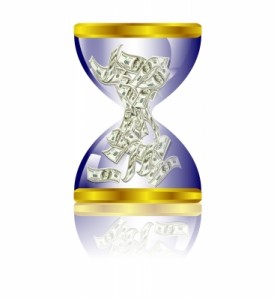What is time to an entrepreneur? Time is a precious resource, much like cash dollars. As you go about building your business, I know you participate in your share of meetings. To what do you charge your meeting time to? If it’s for a current client, that’s part of the cost of doing work for that client, so that’s a no-brainer.
But what if you’re taking meetings with prospective clients, how do you figure the cost of your time? Do you know how to identify the real time associated with a meeting?

Let’s use this example:
I have a lunch meeting that I’ll label as networking/business development with a potential client that I have never met before. I’ve talked to them on the phone, and decided to follow-up with a face-to-face meeting. In this example, I am not getting paid by this prospect for this consultation. My meeting is scheduled from 11:30-12:30. I track client acquisition costs, and time is a cost.
In this client’s file and on my calendar, how much time have I allocated to this meeting? Here’s my answer:
I. Research to prepare for this meeting – one hour
II. On the day of the meeting, I schedule the meeting for 10:40-1:30 on my calendar. Why?
- Travel time + parking is about 35 minutes
- I need a 15 minute buffer to deal with traffic and/or arrive early to the meeting
- Time at the actual meeting (1 hour)
- Time it takes to get to my next destination, or back to the office. (30 minutes)
- Time it takes to write a thank you for the meeting email or note and send it. If you write handwritten notes, you might need to stop by the post office, buy a stamp, and mail it.
- Time it takes to do a meeting debrief, assess the conversation and plan next steps, follow-up with this client to start the next phase of interactions.
This is a rough estimate, but this 11:30-12:30 meeting actually takes more than 4 hours of my time.
This is the amount of time I use as I calculate the real cost of acquiring this client.
This is the time I need to include in my calendar on the day of the meeting.
Simply writing 11:30-12:30 as a meeting on my calendar will not help me to plan my day efficiently.
The same method applies whether you’re an entrepreneur or you work for someone else. Any meeting you attend will most likely have more than the planned meeting time associated with it. The next time you participate in a meeting, estimate the real time your involvement will take and you’ll be more efficient at managing the rest of your time.
Time management is one of those tools that you cannot afford to take for granted. Everyone doesn’t naturally have it, but everyone can learn it. Assessing the real amount of time you spend in meetings is a great place to start. Meetings are some of the biggest time stealers around!
Ciao,
Miss Kemya


Great post. This time tracker tool for meetings will really help you “stop the bleeding” when it comes to saving time and money: http://www.resortentrepreneurs.com/2012/06/11/black-tool-meeting-ticker/ Smiles!